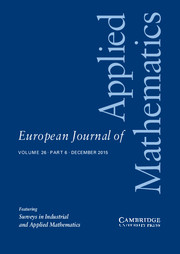Article contents
An algorithmic method to determine integrability for polynomial planar vector fields
Published online by Cambridge University Press: 19 July 2006
Abstract
In this paper we study some aspects of the integrability problem for polynomial vector fields $\dot{x}=P(x,y)$, $\skew1\dot{y}=Q(x,y)$. We analyze the possible existence of first integrals of the form $I(x,y)=e^{ h_1(x) \prod_{k=1}^r (y-a_k(x))/ \prod_{j=1}^s(y-f_j(x))} h_2(x)$$\prod_{i=1}^{\ell} (y-g_i(x))^{\alpha_i}$, where $g_i(x)$ and $f_j(x)$ are unknown particular solutions of $dy/dx=Q(x,y)/P(x,y)$, $\alpha_i \in \mathbb{C}$ are unknown constants, and $a_k(x)$, $h_1(x)$ and $h_2(x)$ are unknown functions. We give an algorithmic method to determine if the polynomial vector field has a first integral of the form above described. In the case when some of the particular solutions remain arbitrary and the other ones are explicitly determined or are functionally related to the arbitrary particular solutions, we will obtain a generalized nonlinear superposition principle, see [6]. In the case when all the particular solutions $g_i(x)$ and $f_j(x)$ are determined, they are algebraic functions and our algorithm gives an alternative method for determining such type of solutions.
- Type
- Papers
- Information
- Copyright
- 2006 Cambridge University Press
- 7
- Cited by


